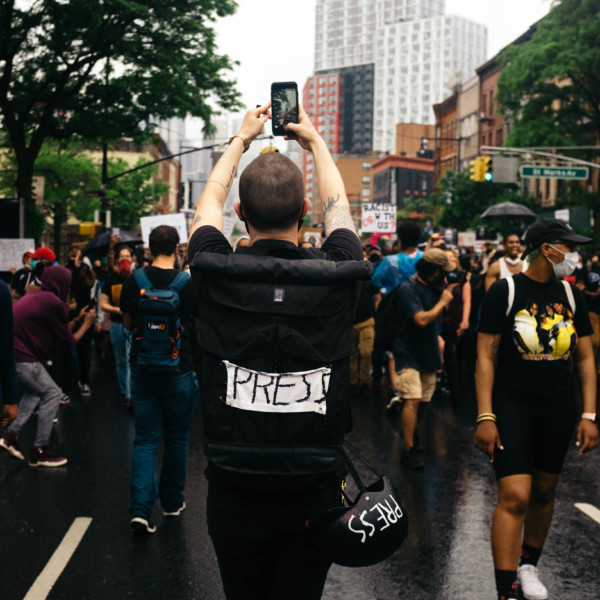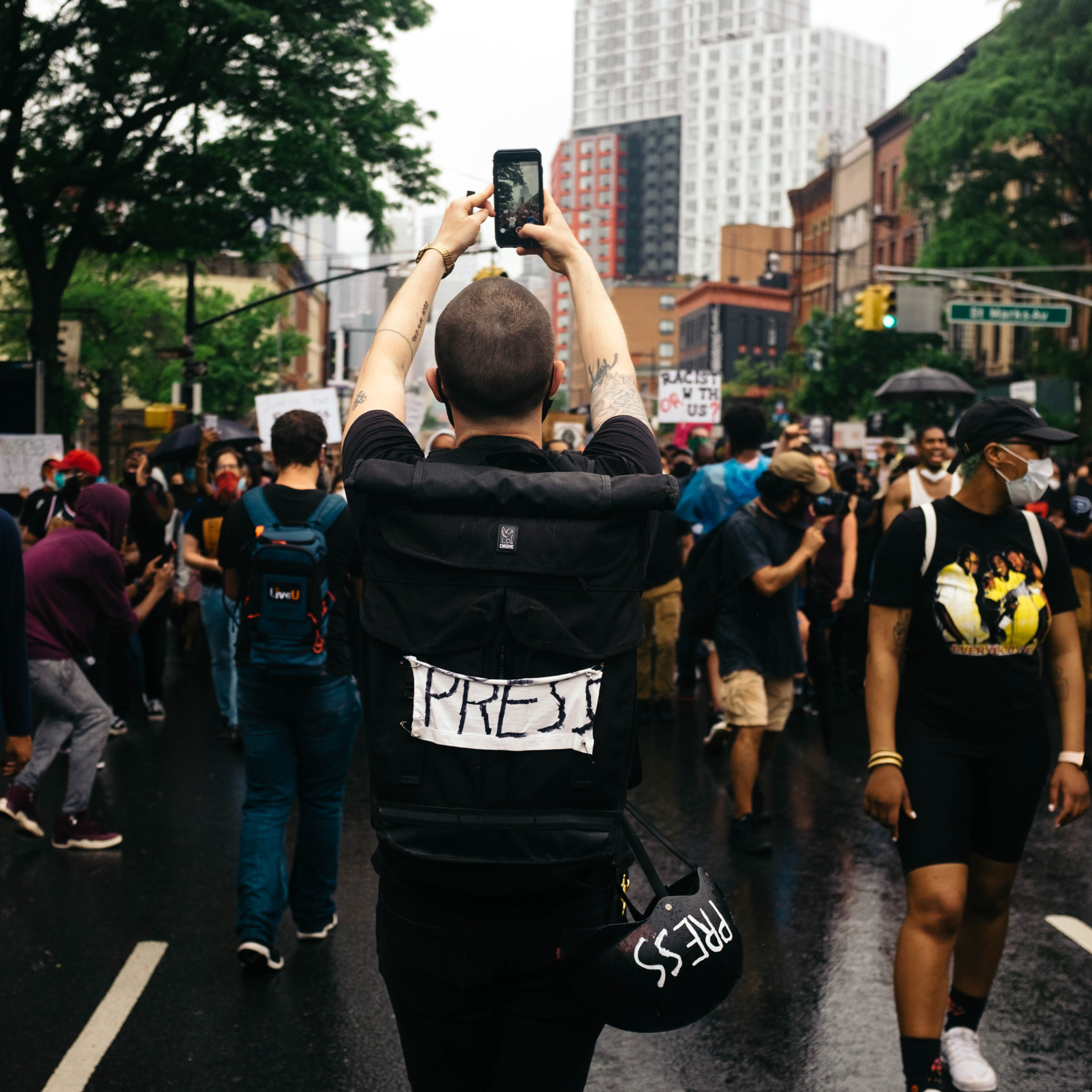Last week, before heading out to report on New York City’s intensifying protests over the death of George Floyd, I cut a patch out of a white T-shirt, scribbled press on it with a black Sharpie, and pinned it to my backpack. A few days later, feeling the need for an added measure of security, I painted press in white-out across my bike helmet.
The labels made me more visible, but it’s unlikely they actually protected me much. After reporting on the protests night after night and repeatedly getting cornered by police, I’m certain the only thing that’s kept me out of jail is the three-by-five-inch plastic rectangle hanging from my neck: my NYPD-issued press pass.
I’ve been arrested before for not carrying press credentials. In 2014, an NYPD officer plucked me from the crowd during a Black Lives Matter march in Times Square and handcuffed me. I spent hours in lockup. I had, in fact, applied for a pass weeks earlier, but the department told me to wait until the following month; I was being punished for doing my job while in bureaucratic limbo. (The Manhattan district attorney’s office eventually dropped the disorderly-conduct charge against me, and I received the pass a few months later.)
ICYMI: Investigating the harsh realities of ‘Cops’
The application process for NYPD credentials is a classic catch-22: to get a press pass, you need to submit four clips to the Office of the Deputy Commissioner for Public Information (DCPI) showing that you write stories that require a press pass, whether covering pressers at NYPD headquarters or reporting from crime scenes. Plenty of journalists, from early-career freelancers to established reporters, are unable to meet the criteria. (New York is not alone in this; other major cities, including Los Angeles and Chicago, have faced similar criticism for the way their police departments handle press credentials.)
Now, as ongoing protests course through the streets, reporters covering the unrest risk arrest and harassment by police. Those without NYPD credentials are especially vulnerable.

Photo of the author by Aidan Gardiner.
A citywide curfew instituted by New York mayor Bill de Blasio from June 1 to 7 was improperly enforced against journalists. Under the curfew, anyone on the streets past 8 pm was subject to arrest on a Class B misdemeanor charge, punishable by up to three months in jail or a fine of up to five hundred dollars. So-called essential workers, a category that includes members of the press—with or without NYPD credentials—were supposed to be exempt. But the memo didn’t reach the cops on the street. Nearly every night last week I was shoved, threatened, or otherwise hassled by cops, and my colleagues across the city endured similar harassment.
Beyond that, the DCPI and mayor’s office gave out conflicting information as to whether reporters without credentials could work past the curfew. In some cases, police let credentialed reporters go while arresting those without passes. (The NYPD did not respond to requests for comment.)
I spoke to more than a dozen New York City reporters who didn’t have a press pass and who said the combination of curfew and the lack of a pass limited their coverage of the marches. Gaby del Valle, a freelancer, live-tweeted two marches the weekend of May 29. Once the curfew was instituted, however, she stopped going out at night.
“I don’t want to be arrested and thrown in a cell without air circulation,” she told me over the phone. “They’re doing that even to people who have credentials or who work at places with legal departments, but I don’t have anything. I’m just a freelancer.”
Reporters are decrying the credentials system on social media, leading to renewed scrutiny of the process. Why should the NYPD be in charge of deciding who is and is not a journalist? Why should the NYPD be allowed to affect a reporter’s ability to do their job? Should the same agency be able to issue press passes and also enforce a curfew that only journalists with passes can safely flout?
The system as it stands is a threat to press freedom. The NYPD regularly denies passes to independent journalists and small publications. The news blog Gothamist, for instance, spent years trying to get its reporters accredited.
As if the difficulty of obtaining a press pass weren’t frustrating enough, the NYPD often doesn’t respect the passes it has already issued. The department grants itself authority and broad discretion to confiscate press passes. Over the years, numerous reporters have had their credentials yanked for pissing off a cop. It is common to hear officers and NYPD commanders threatening reporters to obey orders or lose their press pass.
On June 2, I witnessed officers threaten to revoke reporters’ passes if they got too close to them or stood where they weren’t supposed to. On June 3, an officer asked Alejandra O’Connell, a reporter for AM New York, why she was still on the street at 10 pm, underscoring his question by tapping her camera with his baton. On June 4, an officer in Williamsburg threatened to confiscate the press pass of Ben Verde, a reporter for the Brooklyn Paper. On June 5, an officer shoved Sydney Pereira, a reporter for Gothamist. When Perreira held up her credentials, the officer shouted, “I don’t care!”
These threats extend beyond the immediate protests: for breaking-news reporters and photographers, losing their press pass could mean losing access to their daily beats. It is critical that journalists be free to exercise our rights without the constant threat of interference from the NYPD. The best way to ensure that is to take the responsibility for issuing press passes out of their hands.
City officials seem to finally be coming around. On Saturday, Comptroller Scott Stringer released a statement demanding that the responsibility for issuing press passes be taken away from the NYPD and reassigned to the Office of the Mayor. He called for new standards to ensure more equal access for freelancers and smaller news outlets.
“Our democracy depends on a free, unfettered press,” Stringer wrote on Twitter. “We cannot entrust that essential principle to the sole discretion of law enforcement.”
If the city follows through on Stringer’s demand, I’d welcome it, though I’m also wary of the responsibility falling to the mayor’s office, or to any city agency with political motivations. The best solution is a transparent application process overseen by a neutral bureaucracy.
For now, though, you won’t catch me outside without my press pass.
NEW: With lots to cover, the Black press convenes
Noah Hurowitz is a journalist based in New York City. His work has appeared in CJR, Rolling Stone, the Village Voice, DNAinfo, and other outlets. His debut book, El Chapo: The Untold Story of the World’s Most Infamous Drug Lord, will be published by Atria Books in December.

